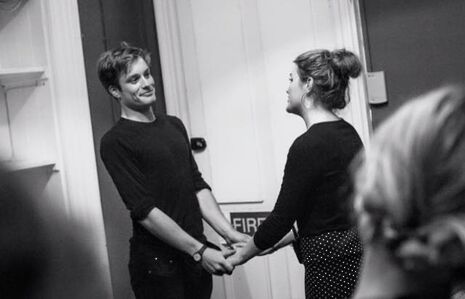Don’t be cowed by the Cambridge Theatre scene – I was, and I regret it
Do not be deterred by set-backs, or the fear that you’re not good enough for Cambridge theatre, says Sarah Wilson

Big fish, small pond. Small fish, big pond. It is the maxim every new student encounters at least once before and once during their time at Cambridge, and one that never bothered me much. Getting a place at King’s was enough for me; I was quite happy to muddle along with my academic work, no longer wanting to be the best of the best. What nobody told me, however, is that this pond wasn’t just made up of talented academics, but talented writers, poets, and actors too. From a young age, I had always been involved in a variety of plays and productions, and I naively envisioned that I might follow the likes of John Cleese or Stephen Fry, and breeze into the Footlights and the theatre scene to continue my love of performance at Cambridge.
Sticking to my guns, despite an overwhelming first week, I rolled up to an audition for one of the freshers’ plays, making it through the first round, but flopping at the second. My timing was off, my voice faltered, and I vaguely remember cringing as my attempted American accent fell down somewhere in Australasia. I knew the second I stepped out of the room that I had messed up, but when the rejection came through, I couldn’t move past it as I used to do. Already feeling like an imposter in my academic work, I took it as a sign that the calibre here was simply too high for me. So as the term went by, I watched gloomily as the same people cropped up again and again in different productions, falling into the ADC clique, and despaired while at a (terrible) swap when some tosser stood up and ‘fined’ anyone who didn’t have any Camdram credits – something I’d never even heard of. I totally lost confidence in myself as I began to feel as though I’d missed out on membership to a very exclusive and insular club.
It was only later in second term that I finally plucked up any courage to audition again, and was shocked when I was given a leading role. The show, Tate Postmodern, was an immersive piece set in an art gallery, and during a term in which I struggled with personal and work-related issues, it was a godsend. I made friends with people from outside college, and remembered quickly how much fun performing can be. Later, we revised the show and took it to the Edinburgh fringe, where it proved the most exciting/hilarious/fun experience I’ve had at university so far. After a May Week production of Twelfth Night at the end of the year, my biggest regret looking back was letting one of my favourite things become such an anxiety, and not auditioning more.
Freshers’ Week is the best time to get involved (trust me you don’t have that much work yet) and you have nothing to lose but so much to gain by having a go. As with many things at Cambridge, the theatre scene can appear cliquey and nepotistic, but you can make of it what you want. Most students get only nine short terms here; it is a waste to spend any one of them believing that you’re not good enough to do something you enjoy.
 Interviews / ‘People just walk away’: the sense of exclusion felt by foundation year students19 April 2024
Interviews / ‘People just walk away’: the sense of exclusion felt by foundation year students19 April 2024 News / Climate activists smash windows of Cambridge Energy Institute22 April 2024
News / Climate activists smash windows of Cambridge Energy Institute22 April 2024 News / Copycat don caught again19 April 2024
News / Copycat don caught again19 April 2024 News / John’s spent over 17 times more on chapel choir than axed St John’s Voices22 April 2024
News / John’s spent over 17 times more on chapel choir than axed St John’s Voices22 April 2024 News / Fitz students face ‘massive invasion of privacy’ over messy rooms23 April 2024
News / Fitz students face ‘massive invasion of privacy’ over messy rooms23 April 2024





